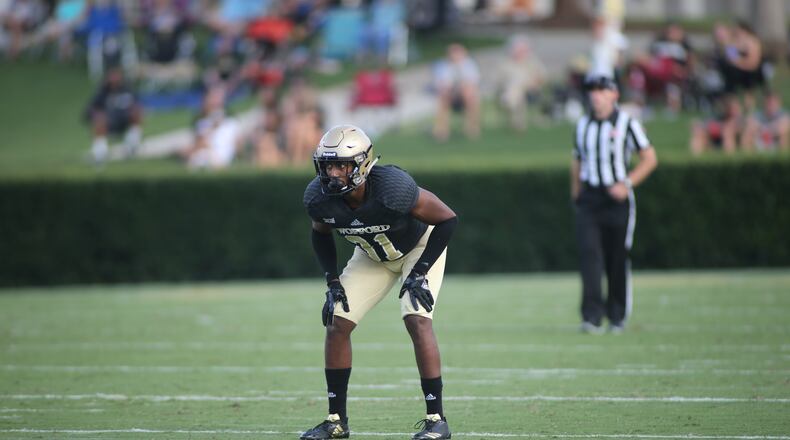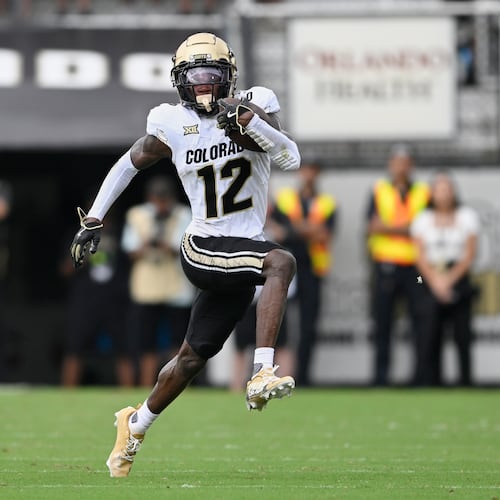Malik Rivera’s former coach was not surprised that he had transformed from a starter at the FCS level to now a starter at free safety for Georgia Tech.
“I’m not a bit,” former Wofford coach Mike Ayers said. “Not a bit.”
Rivera arrived at Tech this summer with little fanfare as a graduate transfer from Wofford. But he’ll be in the defensive starting 11 when the Yellow Jackets begin their season Saturday against Alcorn State at Bobby Dodd Stadium.
It’s recognition of perhaps a few different realities within college football and the Tech team. One, experience matters. Two, the discrepancy in talent between players at the FBS and FCS levels sometimes is negligible. Three, it could be an adventure in the Tech secondary this season.
“He runs well, he’s instinctive, he can tackle, and he ended up being a guy that I think we were fortunate that we were able to recruit him out of high school,” Ayers told the AJC. “It’s pretty neat to see him (at Tech). I’m sure this is an opportunity to fulfill another dream, and that’s playing at the highest level.”
Rivera’s transfer was announced June 5, along with a second grad transfer, long snapper Zach Roberts from Lamar University, an FCS school in Texas. (Roberts is on the depth chart as the No. 1 long snapper.) Rivera came with the advantage of having played for new safeties coach Shiel Wood, who taught a defense at Wofford highly similar to the one used by new defensive coordinator Nate Woody when he was at Appalachian State.
That knowledge already has been well put to use. When Rivera arrived, strong safety Tariq Carpenter began watching game video with him at Wood’s urging to speed his learning of the scheme. On Monday, Carpenter bragged on Rivera that his fellow safety knows every position’s responsibilities from defensive end to safety.
“He’s been in college for, like, five years,” Carpenter said. (This is Rivera’s fifth season. He was on the team but redshirting when Wofford played Tech in 2014.)
On a defense where the secondary features new starters across the board and the entire defense is learning a new scheme, having one player on the field who knows all the answers could prove a huge benefit. Besides Rivera, the other three defensive backs slated to start include two sophomores (cornerback Jaytlin Askew and Carpenter) and a redshirt freshman (cornerback Tre Swilling).
“Stuff where me and (linebacker Brant Mitchell) are looking at each other (because) we’re still trying to learn, he’s – boom – he’ll call out the call and he’ll tell us what we’ve got to do,” linebacker David Curry said. “It’s a big help having him back there.”
At Wofford, Rivera started 13 games at free safety last season and recorded 74 tackles, third on the team. He started five games as a sophomore and helped the Terriers reach the FCS playoffs in both seasons. Learning a defense paled in comparison to what Rivera did in the classroom, where he was a triple major in math, finance and computer science. He was twice named to the Southern Conference all-academic team.
Rivera, who will not be made available for interviews until he plays in a game, applied the same dedication on the field.
“He was just one of those guys that you knew every time what you were going to get,” Ayers said. “He was an effort guy. He was a guy that took pride in making sure that he did the right thing.”
Wofford recruited Rivera out of Bartram Trail High in St. Johns, Fla., the same school attended by Tech running-back commit Devin Ellison. Rivera was perhaps a little undersized, coming out of high school at 5-foot-11 and 190 pounds. (He’s now up to 200 pounds.) Ayers suggested he was a prospect who was undervalued because his measurables overshadowed other unquantifiable traits such as passion and toughness.
Once he picked up the Wofford scheme, Ayers said, “he was a guy that knowledge afforded him an opportunity for being faster than the watch said.”
Johnson has liked what he has seen thus far. He has said previously, particularly when Tech has faced FCS schools, that there are quality players everywhere. Rivera, Johnson said, was a player that Tech could well have recruited out of high school.
Instead, he arrives as a grad-transfer recruit, a delayed arrival that may prove far more beneficial for the Jackets.
About the Author
Keep Reading
The Latest
Featured


